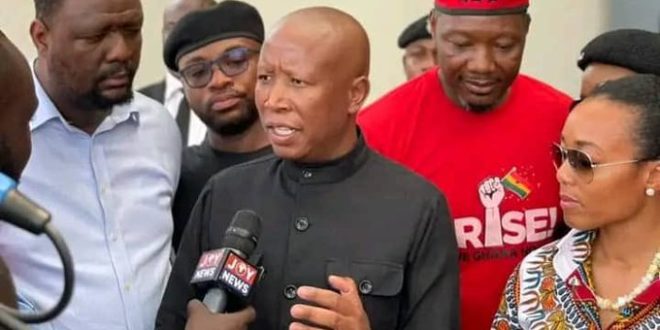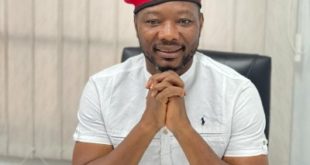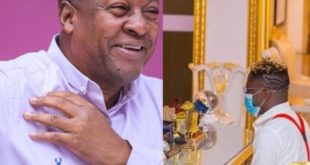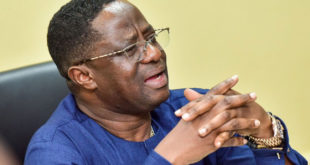South African politician Julius Malema expressed concern about the lack of progress in addressing inter-relations among Africans.
The founder and leader of the Economic Freedom Fighters said this during his speech at the Arise Ghana event on Tuesday, January 23 at the Ghana College for Physicians and Surgeons in Accra.
Read the full text below:
Prior to European arrival, Ghana was home to powerful empires like the mighty Ashanti, renowned for their gold trade and military prowess. These societies had complex social structures, sophisticated cultural traditions, and well-developed trade networks.
An early victim of European interest, the European presence in Ghana began with Portuguese explorers who arrived in the 15th century, and from then till the 19th century, Ghana, then known as the Gold Coast, became a major source of enslaved people for the transatlantic trade. European powers established forts and trading posts along the coast, exchanging manufactured goods for enslaved Africans captured primarily from the interior regions.
The forced removal of millions of people had a profound demographic and social impact on Ghana. It weakened communities, fuelled inter-state conflict, and led to cultural loss.
The transatlantic slave trade left a deep and enduring mark on Ghana’s collective memory. While acknowledging the trauma inflicted, it’s important to recognise the resilience and resistance displayed by many communities and individuals during this period.
However, it was the Dutch, British, and later the French who played more significant roles in the colonisation of the Gold Coast, what is now called Ghana. The British gradually expanded their influence and control through trade and the establishment of forts along the coastline.
By the mid-19th century, the Gold Coast became a British colony. The “Scramble for Africa” saw Britain and other European countries aggressively carving up the continent. The Gold Coast fell under British control, marking the start of formal colonial rule as a result of the Berlin Conference of 1884-1885.
The imposition of colonial rule led to significant social changes. Traditional social structures were often disrupted, and new systems were introduced to serve the interests of the colonisers.
Furthermore, missionary activities played a role in introducing Western education and administration, Christianity, and a class of educated Africans who often aligned with the colonial rulers, while the majority remained marginalised.
Shame on Ghanaian leaders for supporting the invasion of Palestine by Israel – Julius Malema
Watch the video below
British assimilationist policies undermined traditional languages, customs, and belief systems, contributing to a loss of cultural identity.
The Gold Coast economy also became solely reliant on exporting raw materials, hindering internal development.
The formation of political organisations, such as the Aborigines’ Rights Protection Society (ARPS) and later the United Gold Coast Convention (UGCC) and Convention People’s Party (CPP), marked the beginnings of organised political movements seeking self-determination.
Ideas of Pan-Africanism, emphasising continental unity and liberation from colonialism, fuelled the independence movement. Intellectuals like Kwame Nkrumah emerged as powerful voices, advocating for self-determination.
The UGCC, founded in 1947, was an early political organisation advocating for self-government, and leaders like J.B. Danquah were associated with the UGCC. While the CPP, was founded in 1949 by Kwame Nkrumah.
These organisations mobilised mass protests and strikes, forcing the British to acknowledge the desire for independence.
Initially resistant to independence, the British eventually conceded due to international pressure and rising internal dissent. Their primary concern was maintaining economic interests and ensuring a smooth transition.
Traditional authorities and ordinary Ghanaians, from farmers and miners to students and intellectuals, contributed to the struggle through protests, boycotts, and their unwavering support for independence.
As a result, Ghana gained independence on March 6, 1957, becoming the first sub-Saharan African nation to achieve independence from colonial rule.
Kwame Nkrumah, a charismatic leader and proponent of Pan-Africanism became Ghana’s first president after independence in 1957 and his outlook advocated for rapid modernisation, socialist policies, and continental unity.
Ghana provided safe haven and military training to liberation fighters from various countries under colonial rule, particularly in Southern Africa. Movements like South Africa’s African National Congress (ANC), the Movimento Popular de Libertação de Angola (MPLA), and the Frente de Libertação de Moçambique (FRELIMO) benefited from this support.
Nkrumah’s Pan-Africanism was essential in its therefore his relationships of solidarity were intentional beyond Africa and spread to the diaspora. He developed connections with African American artists, and writers in multifaceted and deeply impactful ways characterized by mutual respect, collaboration, and ideological alignment.
Nkrumah, himself a writer, viewed African American intellectual pursuits as evidence of the Black world’s cultural and intellectual prowess. He actively sought connections with American figures like WEB Du Bois, Langston Hughes, and Richard Wright, exchanging letters and visiting them during his time in the US.
African American intellectuals, drawn to Nkrumah’s Pan-African vision and leadership in independent Ghana, saw him as a beacon of hope and a catalyst for continental liberation. Maya Angelou, for example, dedicated poems to Nkrumah, and James Baldwin expressed admiration for his commitment to social justice.
Nkrumah invited prominent African American figures to visit Ghana and contribute to the nation-building process. Maya Angelou worked as an editor for the Ghanaian Times, while W.E.B. Du Bois served as editor for the Encyclopedia Africana. This not only benefited Ghana but also provided platforms for these figures to contribute to a Pan-African project
Nkrumah’s engagement with African American intellectuals helped bridge the gap between the diaspora and the continent, solidifying a sense of shared identity and purpose. This connection paved the way for future collaborations and strengthened the global Black consciousness movement.
Dr Kwame Nkrumah built connections among all blacks so let’s share solidarity among ourselves – Julius Malema
Watch the video below
Ghana has numerous historical sites and museums dedicated to understanding the transatlantic slave trade, such as Elmina Castle and Cape Coast Castle. These sites serve as vital educational tools and memorials to the past of slavery.
It is commendable that Ghana has continued this connection to the diaspora, always preserving the continent as a home to the descendants of the formerly enslaved.
This was formalised in the early 2000s when Ghana established the “Right of Abode” policy, welcoming descendants of slaves to settle and invest in the country. This has allowed many African Americans to connect to their ancestral land, and immerse themselves in African culture.
However, it is important to note that Ghana’s efforts to connect with its diaspora, particularly descendants of slavery, require continuous dialogue, sensitivity to historical narratives, and addressing both practical and emotional hurdles. Building understanding, trust, and mutually beneficial partnerships hold the key to a stronger and more vibrant relationship, ensuring that the past informs a shared future of progress and prosperity.
Ghana’s history reflects the impact of colonialism on its social, political, and economic structures. The struggle for independence involved key figures and movements that sought to reshape the nation and establish a new political and economic order. The legacy of this era continues to shape Ghana’s development and identity today.
Colonial policies focused on extracting resources and serving the needs of the metropole, neglecting infrastructure development and diversifying the economy beyond export-oriented cash crops. As a result, this legacy persists in income inequalities and regional disparities within Ghana.
Furthermore, Ghana still remains heavily reliant on primary commodity exports, making its economy vulnerable to fluctuations in global market prices. This dependence, rooted in colonial trade patterns, hinders diversification and sustainable development.
Additionally, historical relationships with former colonial powers continue to influence foreign policy and economic partnerships, raising concerns about neo-colonialism and the extent of Ghanaian agency in determining its future.
One state of Africa is a threat to Europe – Julius Malema
Watch the video below
Kwame Nkrumah, Ghana’s first president, ushered in a wave of optimism with ambitious visions of Pan-Africanism, rapid development, and socialist policies. He nationalized industries, invested in infrastructure, and established educational institutions.
However, his leadership did not last long enough and the ensuing decades saw a constant flux of military and civilian regimes, with periods of instability and frequent leadership changes. The search for a stable political system and effective economic policies was a struggle.
Ghana has experienced boom periods fuelled by resource exports and cocoa production, followed by crashes due to mismanagement, external shocks, and corruption. Structural adjustment programs imposed by the IMF have increased market liberalisation and reduced state control while promoting privatisation.
These changes disproportionately affected the poor, led to job losses in the public sector, and rising food prices due to marker liberalisation in the agricultural sector. They also led to cuts in social spending on education and healthcare and increased the income inequality gap.
As it stands, as a result of structural adjustment, Ghana still struggles with heavy IMF and World Bank loans, and a limited capacity to independently act, as a result.
Corruption is a threat to democracy – Julius Malema
Watch the video below
It is commendable, that since the late 1990s, Ghana has witnessed a consolidation of democracy with multi-party elections and peaceful transitions of power. However, issues like corruption, youth unemployment, and inequality remain significant challenges.
Most importantly it cannot be said that Economic Freedom was achieved for the people of Ghana.
THANK YOU for constantly reading stories on MyGhanaMedia.com, a news publishing website from Ghana. Kindly like, follow, comment, and SHARE stories on all social media platforms for more entertaining updates!
Follow us on Twitter: https://twitter.com/
Source: MyGhanaMedia.com
There are four types of content published on MyGhanaMedia.com daily: curated content; syndicated content; user-generated content; and original content.
 MYGHANAMEDIA.COM Best Source Of Latest News
MYGHANAMEDIA.COM Best Source Of Latest News





